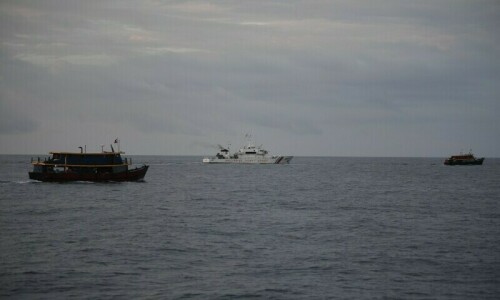GENEVA: The tsunamis that claimed at least 23,000 lives in eight countries on the Indian Ocean Sunday left behind a crucial lesson on the need for an early warning system to reduce the risks and vulnerability of local populations in that region, said United Nations experts.
A simple and timely warning can mean the difference between life and death - or between economic survival and ruin, said Sálvano Briceño, director of the Geneva-based International Strategy for Disaster Reduction (UN/ISDR).
An undersea earthquake of 9.0 on the Richter scale, off the north west coast of Sumatra, Indonesia, triggered tidal waves (tsunamis) that swept coastal regions in the Bay of Bengal (a northern arm of the Indian Ocean) and reached as far as the eastern coast of Africa.
By late Monday, the death toll continued to climb, and thousands of people were still missing. Tsunamis are infrequent, especially in the Indian Ocean. Eighty per cent of these giant waves caused by undersea quakes occur in the Pacific Ocean.
One of the most recent took place in 1998, killing 2,000 people when the water swept inland in Papua New Guinea, devastating several villages. But that was a localised phenomenon, unlike Sunday's disaster, which hit Burma, India, Indonesia, Malaysia, the Maldives, Sri Lanka, Somalia and Thailand.
Sri Lanka, Indonesia, India and Thailand bore the brunt of the damage. In addition, 10 per cent of tsunamis occur in the Atlantic Ocean, explained John Harding, a programme officer at the UN/ISDR.
While an early warning system has been in place in the Pacific rim region since 1948, the countries of the Indian Ocean have no such system. "As soon as an earthquake of this intensity is triggered, the information is provided to all countries (in the Pacific). And now with satellite they can actually monitor the way that they move across the ocean, and they can provide information on the time and the place at which they will impact," Harding told IPS.
"This is basic satellite observation, seismological networks that provide hundreds of pieces of information on earthquakes and tsunamis in the Pacific on a yearly basis. Now, this type of system doesn't exist in the Indian Ocean unfortunately," he added.
The Pacific rim region's early warning system is aimed at coastal populations and communities, who are systematically informed on "how to react when they feel an earthquake," he said.
For example, "If they see the sea receding, there are simple steps that they should take. You should not rush to see what's going on. In the Pacific areas, in Hawaii, there are places where, for example, on each beach you have a simple sign which explains the measures to take when these events occur."
But it is not just a question of advice and instructions for local communities, he underlined. Emergency preparedness and response systems must be put in place.
The World Conference on Disaster Reduction, to be held on Jan 18-22 in Kobe, Japan, will help raise awareness among governments that what is needed is measures before disasters actually occur.
In Japan, for example, "where the community is very well informed, every time an earthquake is triggered within the coastal region" and there is a risk of tsunamis, all of the fishing boats and ships in port go out to sea, where the danger is lessened, said Harding.
Governments, the United Nations and non-governmental organizations are mobilizing to provide humanitarian aid to the countries hit by the catastrophe. Two teams of UN/ISDR experts have been sent to Sri Lanka and the Maldives to assess the need for support from the international community, said Yvette Stevens, Assistant Emergency Relief Coordinator in the UN system in Geneva.
But the UN/ISDR will focus its initial activities on the areas where the greatest needs are found and where the governments have asked for assistance, said Stevens. Some countries, like India and Malaysia, have a greater capacity to provide emergency aid, she added.
UN agencies, donor countries and relief organisations will meet in Geneva on Tuesday to evaluate the situation in the Indian Ocean and the most pressing needs. -Dawn/The Inter Press News Service.













































Dear visitor, the comments section is undergoing an overhaul and will return soon.